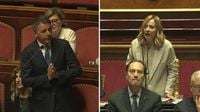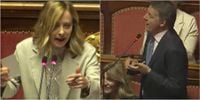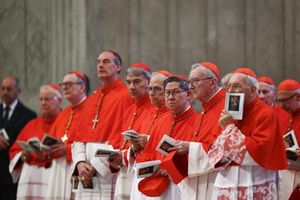On May 7, 2025, tensions flared in the Italian Senate as Prime Minister Giorgia Meloni and former Prime Minister Matteo Renzi engaged in a heated exchange during the 'premier time' session. This confrontation revolved around critical issues including constitutional reforms, electoral laws, and Meloni’s past statements regarding her political positions.
Renzi, the leader of Italia Viva, opened the dialogue by questioning Meloni about her commitment to resign if the proposed reform on the premiership failed to pass. He pointedly asked, "Do you think it is a coherent gesture not to resign if the premiership reform does not go through, just like the other reforms proposed by your government?" Meloni, adopting a sarcastic tone, replied, "Honestly, I missed your question... I would gladly resign, but I would never do anything that you have already done." This remark not only highlighted her refusal to follow Renzi's political footsteps but also set the stage for a back-and-forth that captured the attention of the Senate.
Renzi quickly countered Meloni's response, defending his record in government, which included significant reforms such as labor changes and the introduction of the 80 euro bonus. He asserted, "We had a season of reforms, and it was also a season of civility where the majority listened to the opposition instead of growling and gnashing their teeth." His comments underscored a belief that Meloni’s administration was lacking in constructive dialogue with opposition parties.
The exchange escalated as Renzi accused Meloni of inconsistency, stating, "You have changed your mind about everything. You said strategic infrastructures should be in Italian hands. Since you took office, Americans are in Telecom, Germans in Alitalia, and Australians in Autostrade. Don’t you feel contradictory?" This criticism was met with Meloni’s firm stance that her government was addressing previously compromised strategic situations and moving forward with necessary reforms.
In response to the ongoing debate about the premiership reform, Meloni maintained her position, insisting that the reform remained a priority for her government. She stated, "The premiership? I still consider it the mother of all reforms, but it does not depend solely on me; it depends on Parliament. The majority is certainly determined to proceed swiftly, as is the case with justice reform." This assertion was meant to reassure her supporters that her government was committed to advancing its agenda.
The discussion also touched on foreign policy, particularly regarding Italy's relationship with Russia. Renzi recalled Meloni's past comments from 2015, where she expressed support for Russian President Vladimir Putin, saying, "You said that between the Italian Prime Minister and Putin, you stood with Putin. I, however, stand with you because I am a true patriot." This statement aimed to draw a stark contrast between the two leaders' positions on international alliances.
Additionally, Meloni faced questions about her government’s handling of violence against women. She highlighted increased funding for women's shelters and training for those working in the field, asserting that new laws had been enacted to enhance protections for women and classify femicide as a distinct crime. "We have promoted a law that makes the protection of women more timely and a law that categorizes femicide as a standalone crime to highlight that women die simply for being women," she stated.
Senator Carlo Calenda also raised concerns regarding defense spending and Italy's role in European rearmament. Meloni responded, emphasizing that Italy and Europe were ready to fulfill their responsibilities, declaring, "Freedom has a price; if you cannot defend yourself, you must know that you will not be able to decide independently." She reiterated her commitment to increasing defense spending to meet NATO obligations.
Despite Meloni’s assurances, Calenda expressed dissatisfaction, demanding clarity on how much defense spending would increase and whether it would be net of existing expenditures. He warned that with an aging military, Italy risks becoming a second-class country.
The session also included discussions on economic issues, with Senator Francesco Boccia criticizing Meloni for rising healthcare costs and energy prices. He urged the Prime Minister to focus on reducing gas prices, pointing out that the government's measures had not resolved the crisis. Meloni countered by highlighting regional responsibilities in managing these issues, insisting that her government was committed to finding solutions.
As the debate unfolded, Meloni's responses often included sharp retorts, reinforcing her determination not to mirror Renzi's past actions. She firmly stated, "I would never do anything that you have already done," in reference to the potential for resignation after a failed referendum.
The exchange culminated in a moment of tension when Senate President Ignazio La Russa intervened, cautioning Renzi to maintain decorum. Renzi, undeterred, continued to press his points, emphasizing Meloni's perceived failures and the need for accountability.
In a concluding remark that encapsulated the day’s discourse, Meloni asserted her government’s commitment to reform while maintaining a defensive posture against Renzi’s critiques. The back-and-forth in the Senate not only showcased the political rivalry between these two leaders but also highlighted the broader challenges facing Italy as it navigates complex reforms and international relations.





